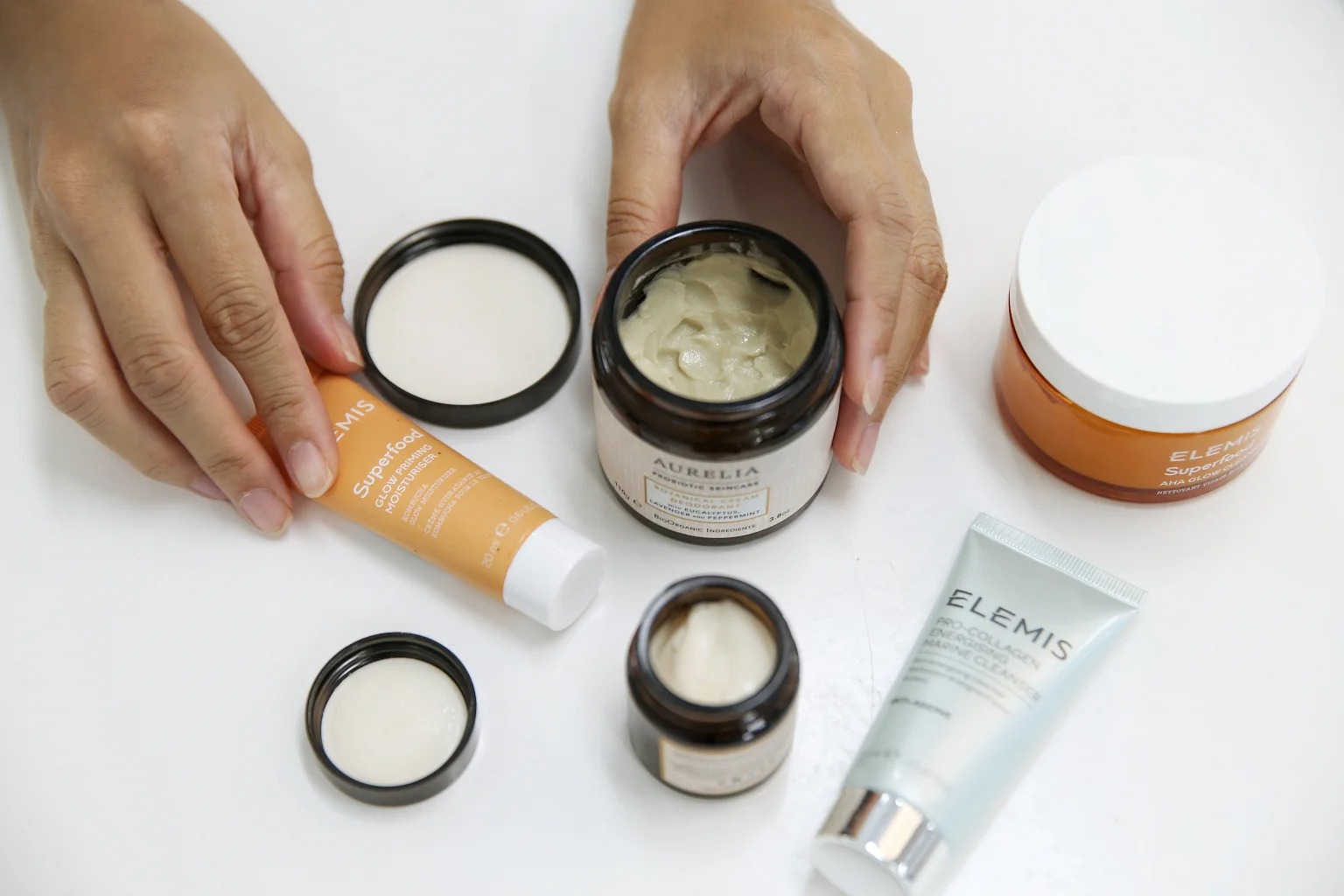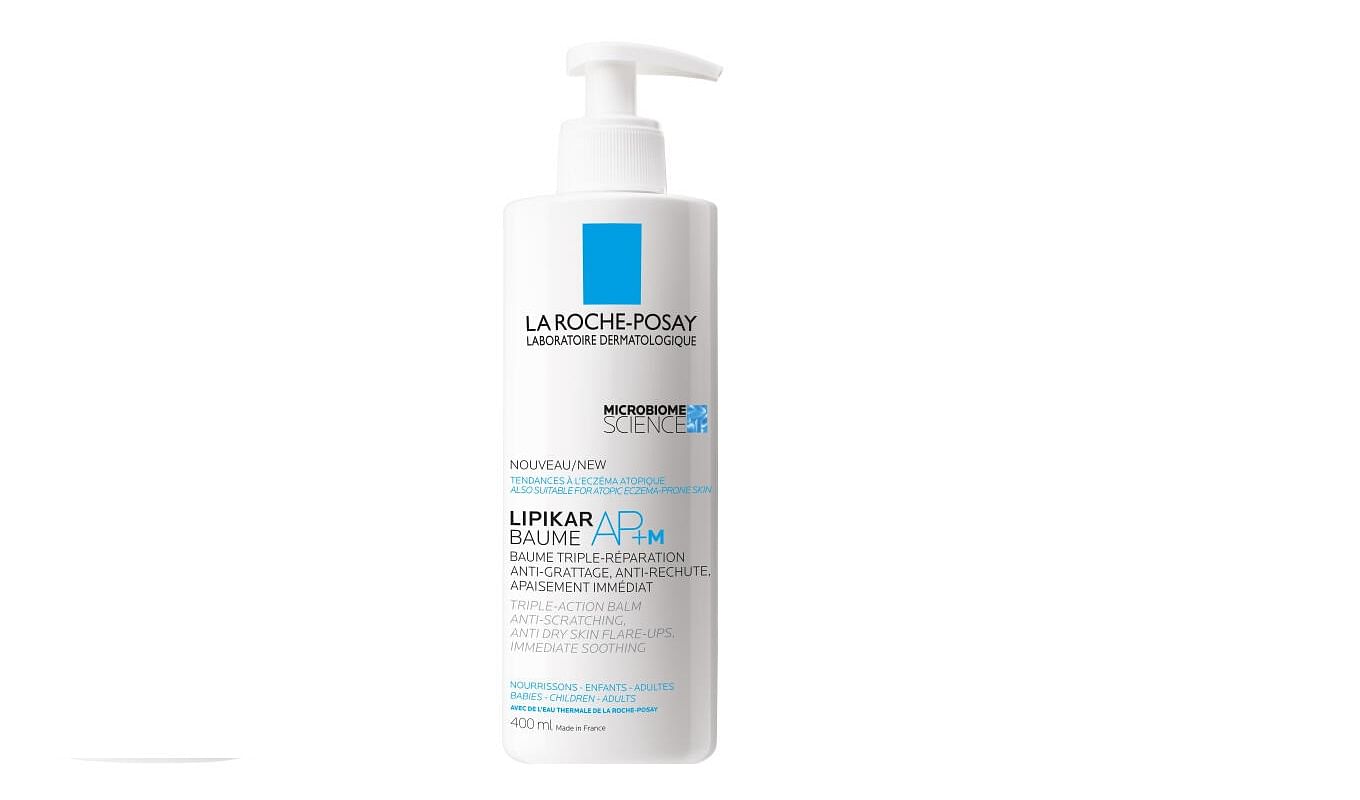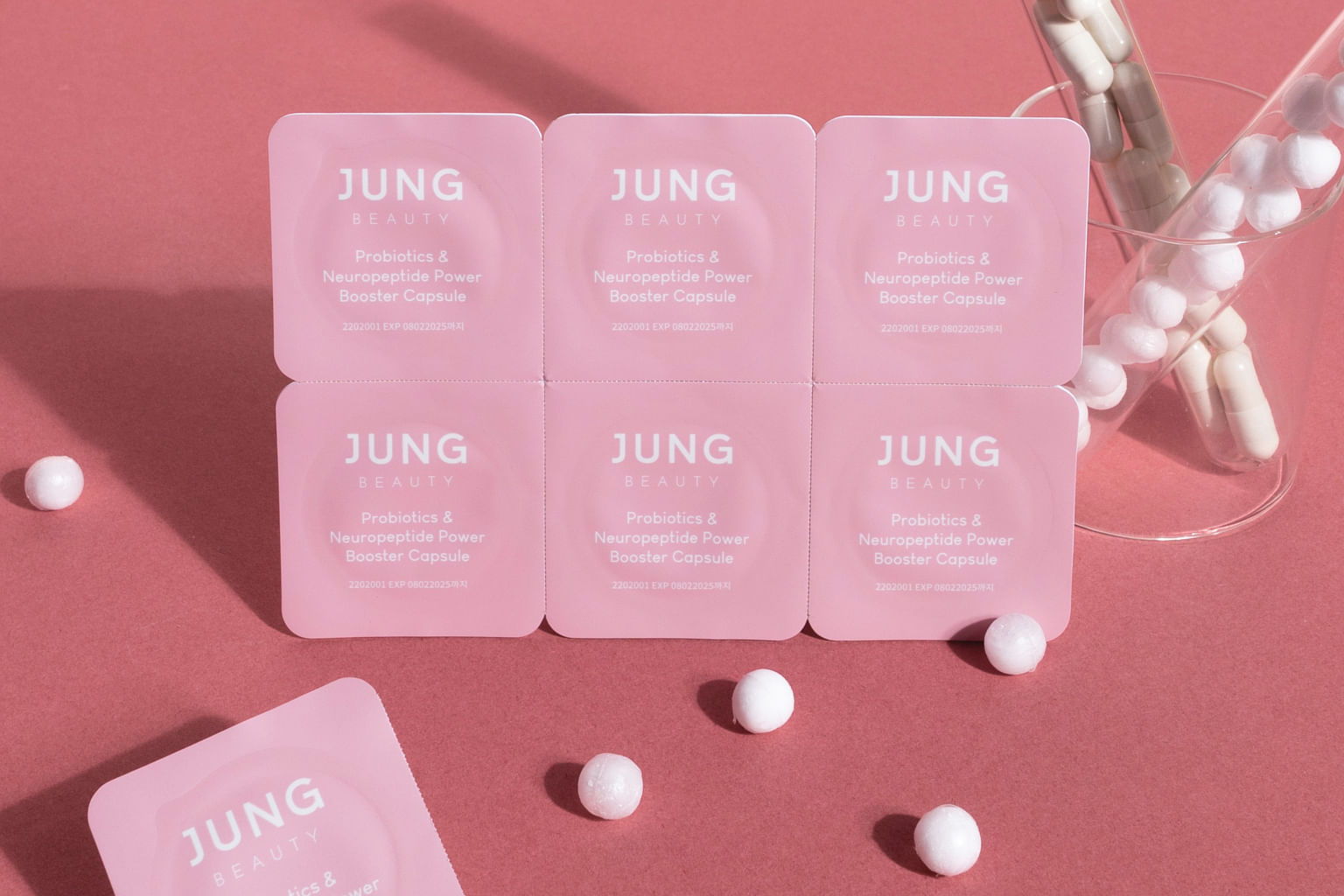Probiotics in skincare: Does it live up to the hype?
Sign up now: Get ST's newsletters delivered to your inbox

There is no harmonised definition of probiotics in cosmetic products, which in strict terms refers to the use of live bacteria.
ST PHOTO: FELINE LIM
SINGAPORE - Even before she founded her own cosmetics line, Sigi Skin, in 2018, Singaporean Xenia Wong was a big believer in probiotic supplements.
The 27-year-old has been popping a pill every morning, seven days a week, for the past five years.
"I've noticed less bloating and indigestion," she says.
Non-profit American medical centre The Mayo Clinic defines probiotics as "foods or supplements that contain live micro-organisms intended to maintain or improve the 'good' bacteria (normal microflora) in the body".
According to an article in Harvard Health Publishing, clinical studies since the mid-1990s suggest that probiotic therapy can help to tackle some gastrointestinal issues, treat allergies in children as well as vaginal and urinary infections in women.
An increasing number of health-conscious individuals are not merely ingesting live bacteria or bacteria extracts in the form of probiotics, but they also are smearing it on their faces.
According to United States-based research and consulting company Grand View Research, the global probiotic cosmetic products market was valued at US$252.5 million (S$347.2 million) in 2019, and is expected to grow at 6.5 per cent annually, from 2020 to 2027.
Ms Wong's own experience led her to "turn it into a topical form, so it could benefit the skin as well".
It took her two years of research to come up with Sigi Skin's first probiotic-infused skincare product - a "hydrating" mask called Tea-Tox.
Developed with the help of South Korean scientists, the mask contains antioxidants derived from yuzu extract, kombucha and fermented sake, as well as 20 per cent lactobacillus ferment, a laboratory-created, non-living probiotic or micro-organism harvested from a dairy product called kefir.
The mask, retailing at Sigi Skin's online store at $32 for a pack of four, sold briskly when it was launched in 2020, at the height of the pandemic.
"Back then, many people were suffering from maskne or acute dermatitis on their skin due to prolonged wearing of masks. Customers told us our mask helped relieve the inflammation. We have also received tons of requests to make the ampoule in Tea-Tox into a serum," she says.

The positive feedback prompted Ms Wong to work on an enhanced product leveraging similarly "healthy" bacteria.
Unveiled in April 2022, Youth Beam is a $99 night serum that incorporates not just superfoods and lactobacillus ferment, but also prebiotics (a food source for probiotics) and postbiotics (the metabolic byproducts of probiotics).
It is believed to be the first of its kind in the Singaporean market.
"Development for Youth Beam costs six digits, more than other products by Sigi Skin as it's tricky to find the right amount of percentage of each type of biotics to complement one another," she says.
Ms Wong is not the only one who is preoccupied with probiotics.
Ms Jungmin Lee, founder of South Korea's leading beauty brand Ksisters, says probiotic skincare is all the rage in her country now.
Her company recently launched its first probiotic product, the Jung Beauty Probiotics & Neuropeptide Power Booster Capsule, containing freeze-dried bacteria that can be added into any moisturiser or serum to "power it up".
The trend is slowly catching on in Singapore as well.

Ms Janice Leong, beauty editor at online beauty blog Look Fantastic, is a fan of probiotic skincare after discovering them through an assignment more than a year ago.
"I have been taking probiotic supplements regularly, but I had no idea probiotic skincare existed," says Ms Leong, 31.
"Once I began using them, however, I could see the difference in my skin. I also just discovered that many of my daily skincare products, including my deodorant, contain hidden probotics."
Mad for microbiome
Before 2007, most microbiome studies focused on beneficial micro-organisms nestled within the gut.
The microbiome refers to the community of micro-organisms that exists in a particular environment and, in the case of humans, a particular part of the body.
However, the Human Microbiome Project, a groundbreaking five-year, US$157 million American-led research, changed all that.
In this 2007 research, scientists uncovered that, in healthy individuals, the epidermis is teeming with billions of microbes, including fungi, yeast, viruses and bacteria. More surprisingly still, not all of these skin-dwelling microbes are bad.
This research would forever alter the way people look at skin health and biology.
"For years, we've tried to eliminate problematic bacteria by using antibiotics. But killing the bad bacteria could also damage beneficial bacteria," says Mr Boris Vogelgesang, R&D director of cosmetic actives at French company Gattefosse, in an interview with online chemistry magazine, C&En.
"We need an approach that recognises the community of flora on the skin and that preserves beneficial bacteria."
A balanced skin microbiome plays a vital function for maintaining skin health, says Dr Tarun Chopra, director of advanced research at cosmetics giant L'Oreal Singapore.
"Research now reveals that an imbalance in skin as well as scalp microbiome is correlated with negative impacts on skin or scalp health, contributing to disorders such as acne, atopic dermatitis, dandruff or sensitive skin," says Dr Chopra in an e-mail interview with The Straits Times.
Armed with lessons gleaned from the Human Microbiome Project, a rising number of established beauty brands and new start-ups are investing large sums of money into the field of skin microbiome, with the aim of developing their own pro-biome lines.
As part of its research into microbiome, American cosmetics giant Estee Lauder Companies has been dabbling in a proprietary in-house fermentation process since 2002.
It led them to discover the benefits of lactobacillus ferment and eventually patent it as a skincare ingredient in 2009.
Several studies have shown that in addition to protecting the skin against environmental aggressors, this probiotic - which naturally occurs on pickled foods and cultured dairy products such as kimchi, yogurt and even sourdough bread - also has anti-microbial and anti-inflammatory properties.
Today, it is used in everything from acne creams and hair detanglers to facial cleansers and anti-ageing serums.

L'Oreal has also made microbiome science the core of its scientific and dermatological research for more than 15 years, says Dr Chopra.
Its most recent innovation is an active protein that selectively kills a harmful bacterium called Staphylococcus aureus while leaving the other microbes alone.
L'Oreal now incorporates these microbiome technologies into products sold under its three skincare brands: La Roche-Posay, Vichy and Lancome.
South Korean beauty conglomerate Amorepacific, meanwhile, launched the Green Tea Probiotics Research Centre in 2020 to study a lactobacillus strain, APsulloc.
Found to have "anti-inflammatory effects on human skin tissues and immune cells", it has since been patented and used in several cosmetic products, including Laneige Water Sleeping Mask EX and Labo-H products, its skincare shampoo brand.
Science or pseudo-science?
A 2019 article by the International Journal of Cosmetic Science says that from a regulatory standpoint, there is no harmonised definition of probiotics in cosmetic products, which in strict terms refers to the use of live bacteria.
Since most cosmetic products contain a "large amount of water and preservatives which are used to prevent bacterial growth and spoilage", most probiotic skincare contain "deactivated" bacteria in the form of "bacterial fermentation or cell lysates (in which the bacteria is broken down into a more stable and dead form)" rather than live bacteria.
So when South African cosmetics company Esse Skincare released a probiotic serum in 2015 that claims to have "one billion live probiotic microbes per millilitre" to "rewild the skin", it alarmed regulators in the European Union.
Import standards bar products that contain more than a certain amount of microbes per millilitre to prevent microbial contamination. The company had to engage with regulators to get clearance.
But as the race towards microbiome skincare heats up and claims get wilder and more difficult to verify, several questions emerge: Just how effective - and safe - are some of these products?
Dr Rachel Ho, who frequently blogs about trending skincare products, says the onus is currently on the beauty companies to ensure their products are safe and live up to their claims.
"I am uncertain about the benefits of including a billion live microbes. Probiotic skincare is very trendy, and so companies just hype it up," she says.
However, the medical director of La Clinic says preliminary studies have shown that using probiotics in skincare may help improve skin inflammation such as acne and eczema as well as vanquish free radicals which accelerate ageing.
"The studies behind probiotic skincare are not as robust as studies supporting other active ingredients. So, while a few small studies suggest that using probiotics can help with acne, it's not enough for doctors to recommend probiotic skincare over retinoids," she says.
Moreover, knowledge about probiotics has been limited to specific species and strains.
"In other words, the benefits of probiotics are strain-specific, so simply using any probiotic product - which may not contain strains that are beneficial - may not be useful," she says.
Dr Angeline Tay, a microbiome team leader working with Dr Chopra, also says that while "non-living" microbiome actives have shown a lot of promise, a personalised approach, rather than a one-size-fits-all formula, could take efficacy to the next level as skin microbiome differs from one person to the next.
Her advice? "One could adopt a skincare routine that avoids harsh cleansers and instead incorporate products containing prebiotics, probiotic ferment extracts and postbiotics.
"These ingredients can help improve the balance of microbes on your skin microbiome, reinforce your skin's natural barrier and contribute to a healthier skin ecosystem.
"Till then, the scientific community is working hard towards the next generation of microbiome powered cosmetic and dermatological solutions."
Biotic Beauty
Here are some products that are said to harness the power of microbiome-powered therapeutics.
La-Roche Posay's Lipikar Baume AP+M, $56.90 for 400ml

Prone to eczema? Then check out this new cream, which is formulated with a microbiome-friendly complex that is said to limit the spread and persistence of Staph bacteria that causes eczema. It also contains shea butter, niacinamide and a bacterial extract that is found in the thermal spring water used by the label.
Sigi Skin's Youth Beam, $99

This home-grown anti-ageing serum contains all three biotics - prebiotics, probiotics and postbiotics - in addition to hyaluronic acid and superfood extracts from mushrooms, ginger, pine bark and pennywort.
Lancome's Advanced Genifique Serum, $135

In addition to hyaluronic acid and vitamin C, this French beauty brand's best-selling serum contains a complex of seven pre- and probiotic fractions that are said to help strengthen the skin's microbiome.
Vichy's Normaderm Probio-BHA Serum, $54

Made for acne-prone skin, Vichy's new serum contains 5 per cent exfoliating acids that are said to help correct acne marks and refine skin texture, along with 5 per cent probiotic fractions which can strengthen skin barrier.
Jung Beauty's Probiotics & Neuropeptide Power Booster Capsules, 18 capsules for $65

Pop a capsule into any liquid skincare product of your choice and it will melt instantly. The capsule combines freeze-dried technology with probiotics and neuropeptides.


